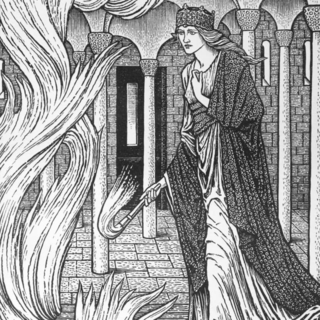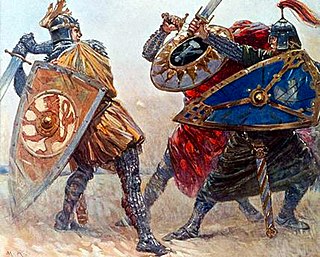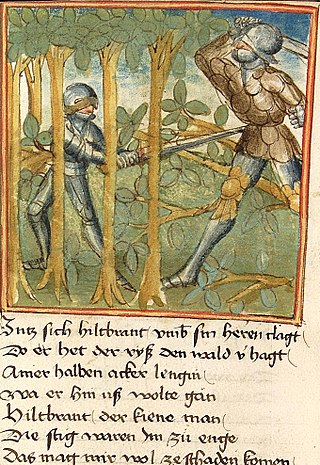Related Research Articles

The Nibelungenlied, translated as The Song of the Nibelungs, is an epic poem written around 1200 in Middle High German. Its anonymous poet was likely from the region of Passau. The Nibelungenlied is based on an oral tradition of Germanic heroic legend that has some of its origin in historic events and individuals of the 5th and 6th centuries and that spread throughout almost all of Germanic-speaking Europe. Scandinavian parallels to the German poem are found especially in the heroic lays of the Poetic Edda and in the Völsunga saga.

Gudrun or Kriemhild is the wife of Sigurd/Siegfried and a major figure in Germanic heroic legend and literature. She is believed to have her origins in Ildico, last wife of Attila the Hun, and two queens of the Merovingian dynasty, Brunhilda of Austrasia and Fredegund.

Heldenbücher is the conventional title under which a group of German manuscripts and prints of the 15th and 16th centuries has come down to us. Each Heldenbuch contains a collection of primarily epic poetry, typically including material from the Theodoric cycle, and the cycle of Hugdietrich, Wolfdietrich and Ortnit. The Heldenbuch texts are thus based on medieval German literature, but adapted to the tastes of the Renaissance.

Wolfdietrich is the eponymous protagonist of the Middle High German heroic epic Wolfdietrich. First written down in strophic form in around 1230 by an anonymous author, it survives in four main versions, widely differing in scope and content, and largely independent of each other.

Der Rosengarten zu Worms, sometimes called Der große Rosengarten to differentiate it from Der kleine Rosengarten (Laurin), and often simply called the Rosengarten, is an anonymous thirteenth-century Middle High German heroic poem in the cycle of Dietrich von Bern. The Rosengarten may have been written as early as before 1250, but is securely attested by around 1300. It is unclear where it was written.

Witege, Witige or Wittich or Vidrik "Vidga" Verlandsson is a character in several Germanic heroic legends, poems about Dietrich von Bern, and later Scandinavian ballads.

Alpharts Tod is an anonymous late medieval Middle High German poem in the poetic cycle of the hero Dietrich von Bern, the counterpart of the historical Ostrogothic king Theodoric the Great in Germanic heroic legend. It is part of the so-called "historical" Dietrich material. It may have written as early as between 1245 and 1300, but it is only transmitted in a single manuscript from around 1470 or 1480. The place of composition is unknown.

Goldemar is a fragmentary thirteenth-century Middle High German poem by Albrecht von Kemenaten about the legendary hero Dietrich von Bern, the counterpart of the historical Ostrogothic king Theodoric the Great in Germanic heroic legend. It is one of the so-called fantastical (aventiurehaft) Dietrich poems, so called because it more closely resembles a courtly romance than a heroic epic.

Dietrich von Bern is the name of a character in Germanic heroic legend who originated as a legendary version of the Ostrogothic king Theodoric the Great. The name "Dietrich", meaning "Ruler of the People", is a form of the Germanic name "Theodoric". In the legends, Dietrich is a king ruling from Verona (Bern) who was forced into exile with the Huns under Etzel by his evil uncle Ermenrich. The differences between the known life of Theodoric and the picture of Dietrich in the surviving legends are usually attributed to a long-standing oral tradition that continued into the sixteenth century. Most notably, Theodoric was an invader rather than the rightful king of Italy and was born shortly after the death of Attila and a hundred years after the death of the historical Gothic king Ermanaric. Differences between Dietrich and Theodoric were already noted in the Early Middle Ages and led to a long-standing criticism of the oral tradition as false.

Sigenot is an anonymous Middle High German poem about the legendary hero Dietrich von Bern, the counterpart of the historical Ostrogothic king Theodoric the Great in Germanic heroic legend. It is one of the so-called fantastical (aventiurehaft) Dietrich poems, so called because it more closely resembles a courtly romance than a heroic epic. It was likely written in the Alemannic dialect area, no later than 1300.

Der Wunderer, or Etzels Hofhaltung is an anonymous Early New High German poem about the legendary hero Dietrich von Bern, the counterpart of the historical Ostrogothic king Theodoric the Great in Germanic heroic legend. It is one of the so-called fantastical (aventiurehaft) Dietrich poems, so called because it more closely resembles a courtly romance than a heroic epic. The poem may have been written before 1300, but is not attested until the turn of the sixteenth century.

Laurin or Der kleine Rosengarten is an anonymous Middle High German poem about the legendary hero Dietrich von Bern, the counterpart of the historical Ostrogothic king Theodoric the Great in Germanic heroic legend. It is one of the so-called fantastical (aventiurehaft) Dietrich poems, so called because it more closely resembles a courtly romance than a heroic epic. It likely originates from the region of South Tyrol, possibly as early as 1230, though all manuscripts are later.

Virginal, also known as Dietrichs erste Ausfahrt, or Dietrich und seine Gesellen is an anonymous Middle High German poem about the legendary hero Dietrich von Bern, the counterpart of the historical Ostrogothic king Theodoric the Great in Germanic heroic legend. It is one of the so-called fantastical (aventiurehaft) Dietrich poems, so called because it more closely resembles a courtly romance than a heroic epic. The poem was composed by 1300 at the latest, and may have been composed as early as the second quarter of the thirteenth century.

The Jüngeres Hildebrandslied or Das Lied von dem alten Hildebrand is an anonymous Early New High German heroic ballad, first attested in the fifteenth century. A late attestation of Germanic heroic legend, the ballad features the same basic story as the much older Hildebrandslied, but was composed without knowledge of that text. Rather, it reworks the oral legend of the warrior Hildebrand and his fight against his son in accordance with late medieval and early modern taste. It is highly sentimentalized and focuses on Hildebrand's return home rather than the tragic conflict of the older tradition.

Dietrichs Flucht or Das Buch von Bern is an anonymous 13th-century Middle High German poem about the legendary hero Dietrich von Bern, the legendary counterpart of the historical Ostrogothic king Theodoric the Great in Germanic heroic legend. It is part of the so-called "historical" Dietrich material and is closely related to, and always transmitted together with a second Dietrich poem, the Rabenschlacht. A Heinrich der Vogler is named as author in an excursus of the poem. Earlier scholarship considered him to be the author of Dietrichs Flucht and possibly also of the Rabenschlacht, however more recent scholarship believes he is only author of this excursus.

Die Rabenschlacht is an anonymous 13th-century Middle High German poem about the hero Dietrich von Bern, the counterpart of the historical Ostrogothic king Theodoric the Great in Germanic heroic legend. It is part of the so-called "historical" Dietrich material and is closely related to, and always transmitted together with another Dietrich poem, Dietrichs Flucht. At one time, both poems were thought to have the same author, possibly a certain Heinrich der Vogler, but stylistic differences have led more recent scholarship to abandon this idea.

Das Eckenlied or Ecken Ausfahrt is an anonymous 13th-century Middle High German poem about the legendary hero Dietrich von Bern, the counterpart of the historical Ostrogothic king Theodoric the Great in Germanic heroic legend. It is one of the so-called fantastical (aventiurehaft) Dietrich poems, so called because it more closely resembles a courtly romance than a heroic epic.

Ermenrichs Tod or Koninc Ermenrîkes Dôt is an anonymous Middle Low German heroic ballad from the middle of the sixteenth century. It is a late attestation of Germanic heroic legend.

Biterolf und Dietleib is an anonymous Middle High German heroic poem concerning the heroes Biterolf of Toledo and his son Dietleib of Styria. It tells the tale of Biterolf and Dietleib's service at the court of Etzel, king of the Huns, in the course of which the heroes defeat Etzel's enemies, including an extended war/tournament against the Burgundian heroes of the Nibelungenlied. As a reward for their services, Dietleib and Biterolf receive the March of Styria as a fief. The text is characterized by its comedic parody of the traditions of heroic epic.
Die Nibelungenklage or Die Klage is an anonymous Middle High German heroic poem. The poem describes the laments for and burial of the dead from the Nibelungenlied, as well as the spread of the news of the catastrophe that ended the other poem, and the fates of the various characters who survived. It was likely written at around the same time as the Nibelungenlied, and is appended to it as though it were another episode (âventiure).
References
- Eis, Gerhard (1953). "Zu Dietrichs Slawenkämpfen". Zeitschrift für deutsches Altertum und deutsche Literatur. 84: 7–84.
- Gillespie, George T. (1973). Catalogue of Persons Named in German Heroic Literature, 700-1600: Including Named Animals and Objects and Ethnic Names. Oxford: Oxford University. ISBN 9780198157182.
- Handschriftencensus (2001). "Gesamtverzeichnis Autoren/Werke: 'Dietrich und Wenezlan'". Handschriftencensus. Retrieved 1 April 2018.
- Haymes, Edward R.; Samples, Susan T. (1996). Heroic legends of the North: an introduction to the Nibelung and Dietrich cycles. New York: Garland. pp. 95–96. ISBN 0815300336.
- Heinzle J (1980). "Dietrich und Wenezlan". In Ruh K, Keil G, Schröder W (eds.). Die deutsche Literatur des Mittelalters. Verfasserlexikon. Vol. 2. Berlin, New York: Walter De Gruyter. cols 149–151. ISBN 978-3-11-022248-7.
- Heinzle, Joachim (1999). Einführung in die mittelhochdeutsche Dietrichepik. Berlin, New York: De Gruyter. pp. 94–97. ISBN 3-11-015094-8.
- Hoffmann, Werner (1974). Mittelhochdeutsche Heldendichtung. Berlin: Erich Schmidt. ISBN 3-503-00772-5.
- Lienert, Elisabeth (2015). Mittelhochdeutsche Heldenepik. Berlin: Erich Schmidt. pp. 114–115. ISBN 978-3-503-15573-6.
- Millet, Victor (2008). Germanische Heldendichtung im Mittelalter. Berlin, New York: de Gruyter. pp. 380–381. ISBN 978-3-11-020102-4.